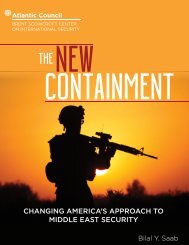POLITICS GOVERNANCE STATE-SOCIETY RELATIONS
Politics_Governance_and_State-Society_Relations_web_1121
Politics_Governance_and_State-Society_Relations_web_1121
Create successful ePaper yourself
Turn your PDF publications into a flip-book with our unique Google optimized e-Paper software.
<strong>POLITICS</strong>, <strong>GOVERNANCE</strong>, AND <strong>STATE</strong>-<strong>SOCIETY</strong> <strong>RELATIONS</strong><br />
EXECUTIVE SUMMARY<br />
The upending of the Middle Eastern order since<br />
2011 came about primarily because of failures of<br />
governance. We must properly understand the why<br />
and how of this Middle Eastern breakdown if we<br />
are to recognize and commit to the work that is<br />
truly necessary to build a new, secure, and durable<br />
regional order. Investing in sustainable governance<br />
is important for the world and for the rising<br />
generation of young Arabs, who can either become<br />
a force for tremendous progress or a generation<br />
lost to violence and despair.<br />
How and Why the System Collapsed, and<br />
What It Means<br />
The regional collapse since 2011 is<br />
the outcome of a long-standing<br />
crisis in state-society relations in<br />
the Arab world—one that took<br />
several decades to germinate.<br />
Regional governments failed to<br />
adequately address this brewing<br />
crisis, and indeed some of them<br />
undertook policies that only<br />
exacerbated the problem. When<br />
popular uprisings burst into<br />
the open in 2011, many leaders<br />
responded poorly, deepening<br />
societal divisions, weakening<br />
institutions, and enabling the<br />
growth of violent extremist<br />
movements. Several states have<br />
now collapsed into civil war,<br />
but more remain vulnerable to<br />
instability. The drivers of change<br />
exist all across the region, in every environment.<br />
No state is immune from the imperative to reform<br />
governance into a more sustainable form. The<br />
manner in which the regional order broke down<br />
and the past five years of turmoil and disappointed<br />
expectations have generated a crisis of order and a<br />
crisis of authority. The lack of trust between citizens,<br />
political leaders, and governments is perhaps<br />
the most daunting obstacle to the restoration of<br />
regional stability.<br />
Understanding how and why the Arab state system<br />
collapsed in 2011 reveals that the capacity of Arab<br />
Three models<br />
contend for<br />
dominance in<br />
today’s Middle<br />
East: fragile<br />
democracy<br />
(Tunisia); order<br />
through savagery<br />
(ISIS); and renewed<br />
authoritarianism<br />
(Egypt under Sisi).<br />
states to address local and regional security threats<br />
depends in large part on structuring their political<br />
institutions and repairing the breach between states<br />
and society. The failure to revise governance, by<br />
contrast, will invite escalating security challenges.<br />
The future of the region will largely be determined<br />
by the quality of governance, not its mere existence.<br />
Governance that will last, and that positions states<br />
to be effective and reliable partners in maintaining<br />
regional stability, will have four key characteristics:<br />
it will be more inclusive, more transparent, more<br />
effective, and more accountable. Liberal democracy<br />
is far more likely than any other regime type to<br />
exhibit these characteristics, and the hunger for<br />
democratic self-government<br />
endures today. But the path<br />
to democratic government is<br />
neither swift nor linear.<br />
Existing Models for<br />
Governance<br />
Five years after the Arab<br />
uprisings, and with the failure of<br />
all but one effort at governance<br />
transformation, we look<br />
across the Arab world and see<br />
several failed or failing states,<br />
new authoritarian models,<br />
and a number of recalcitrant<br />
autocracies holding on through a<br />
combination of heavy spending,<br />
increased coercion, and the soft<br />
bigotry of low expectations<br />
generated by fear both at home<br />
and abroad (“At least we’re/they’re not ISIS”). Three<br />
models contend for dominance in today’s Middle<br />
East: fragile democracy (Tunisia); order through<br />
savagery (ISIS); and renewed authoritarianism<br />
(Egypt under Sisi). The latter two models do not<br />
offer a stable or successful path for the future of<br />
Middle Eastern states.<br />
Given the level of violence suffusing the region, the<br />
fear and mistrust that suffuse local populations,<br />
and the ugly “race to the bottom” underway<br />
where extremism and authoritarianism compete<br />
as alternative models for Arab governance, it<br />
ATLANTIC COUNCIL<br />
3



